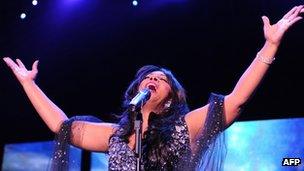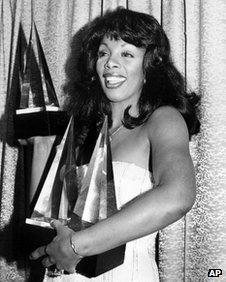Obituary: Donna Summer
- Published

Summer is best known for the global hit I Feel Love
The woman who would become known as the Queen of Disco, Donna Summer, was born in Massachusetts in 1948.
She began her life in the spotlight as a backing singer for 1970s trio Three Dog Night, releasing her first solo album in 1974.
Her first US chart success came in 1975 with Love To Love You Baby, which raised eyebrows with its erotic lyrics and sultry vocals.
She went on to become one of the defining voices of the era with a string of hits including I Feel Love, State of Independence, Bad Girls and She Works Hard For The Money.
'Skyscraping blend'
Music critic Garry Mulholland described her voice in her 1977 song I Feel Love as a "skyscraping blend of American gospel and light opera".
"On the radio, I Feel Love's insistent ethereality smothered the orchestral funk of US disco and stood out so completely you found yourself riveted by its awe and its glowing ache. On the dance floor, the effect was even more profound," he wrote in his book This Is Uncool.
She notched up a stack of awards during her long career, and had 19 number one US chart hits between 1975-2008.
She had five Grammys to her name and was also the first artist to have three consecutive double albums to reach number one in the US charts.
Unlike many disco stars, Summer was able to move beyond the genre and develop a more pop-rock sound.
Her style and her music shaped the dance music that was to follow, influencing David Bowie, as well as bands like Duran Duran.

Donna Summer won many awards, including three at the American Music Awards in 1979
The Rolling Stone lists I Feel Love as one of the top 500 singles of all time.
"Its impact on dance music is incalculable. When Brian Eno first listened to this, he told David Bowie, 'I've heard the sound of the future'. Thanks to Giorgio Moroder's throbbing Moog synthesisers and Summer's epic vocals, I Feel Love claimed tomorrow in the name of disco."
It all began when she stood up in church one Sunday in Boston and began to sing, reducing her father to tears.
"I discovered right then that God had blessed me. I had a talent. I knew I was going to be great," <link> <caption> she told the Washington Post in a 1978 interview</caption> <altText>Washington Post: 'Interview with Donna Summer, 1978'</altText> <url href="http://www.washingtonpost.com/blogs/arts-post/post/donna-summer-dies--remembering-the-disco-queen-through-the-post-archives/2012/05/17/gIQAYz0GWU_blog.html" platform="highweb"/> </link> , when she was at the height of her fame.
'Frenzy'
But she wasn't always comfortable with the success, describing returning from a period in Europe to the US as walking "into this commotion".
"I got off the plane and there was all this frenzy. I didn't understand it, I was shocked and I almost had a nervous breakdown."
In 2003, she said success had initially taken her by surprise.
"I was going through a lot of adversity right up until that point and then one day there was a knock at the door and everything changed and I went from being a victim to being celebrated and the mental adjustment and the internal adjustment did not follow that quickly."
"It took me years to bring that other person up to the standard of what was going on in my life."
In the 1980s, Summer became a born-again Christian. At the time, she attracted controversy when she was accused of making anti-gay comments about the Aids epidemic that was raging at the time. She denied making the remarks but was nonetheless subjected to a boycott.
Later in the same decade, Summer teamed up with British producers Stock Aitken Waterman for an album that included the hit This Time I Know It's For Real.
Wary of the 'Queen of Disco' title, Summer successfully reinvented her musical style throughout her career.
"I am actually the first woman - not black woman - but woman, period, to get a rock-and-roll Grammy," she told the Windy City Times in 2009. "I don't take it as an insult but I am still working and there are fields that I haven't conquered yet. I won't stop until someone says, 'It's over.'"
She continued to work until the end of her life. Her last LP album, Crayons, was released in 2008, after a 17-year break.
That year, she also performed on American Idol, and a year later, sang at the Nobel Peace Prize ceremony in Oslo.
Born LaDonna Adrian Gaines, she acquired her stage name from her 1973 marriage to Austrian actor Helmuth Sommer, with whom she had fallen in love two years earlier while both were appearing in the musical Godspell in Austria.
The couple had a daughter, Mimi Sommer, but the marriage did not last, ending in divorce in 1975.
In 1980, she married again, this time to musician Bruce Sudano, with whom she had two daughters, Brooklyn and Amanda.
- Published17 May 2012